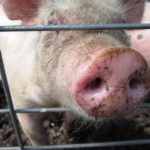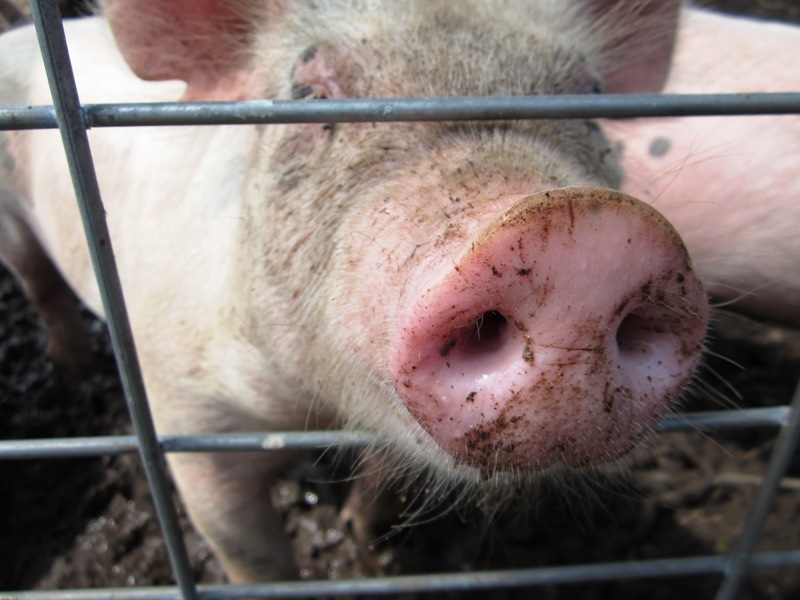In 2018, California voters passed “Prop 12,” a ballot proposal regulating space requirements for farm animals. The proposal had two main components. First, it prohibited the act of confining farm animals (egg-laying hens, veal calves and breeding pigs) in a “cruel manner.” This prohibition applied to actions and animals within the state of California. Second, it prohibited the sale of products within the state that had been made from animals who had been confined in the “cruel manner” outlined in California’s law. This effectively imposed Prop 12’s animal housing standards on any producer, no matter the location, who wished to sell products to residents of California. Given that 12% of the United States population lives in the state, the market share, and thus the effect of the law, is considerable. The legality of Prop 12 was promptly challenged in several cases. An in-depth discussion of these cases was published by the NALC in February of this year and is available here. Today’s blog post will provide an update of the previous version with events from the past 6 months.
for farm animals. The proposal had two main components. First, it prohibited the act of confining farm animals (egg-laying hens, veal calves and breeding pigs) in a “cruel manner.” This prohibition applied to actions and animals within the state of California. Second, it prohibited the sale of products within the state that had been made from animals who had been confined in the “cruel manner” outlined in California’s law. This effectively imposed Prop 12’s animal housing standards on any producer, no matter the location, who wished to sell products to residents of California. Given that 12% of the United States population lives in the state, the market share, and thus the effect of the law, is considerable. The legality of Prop 12 was promptly challenged in several cases. An in-depth discussion of these cases was published by the NALC in February of this year and is available here. Today’s blog post will provide an update of the previous version with events from the past 6 months.
National Pork Producers Council v. Ross
One of the cases, National Pork Producers Council v. Ross (“NPPC”), has worked its way through the appellate process, and next month the United States Supreme Court (“USSC”) will hear oral arguments on its way to deciding Prop 12’s future. The court will be considering whether the second component of Prop 12, regulating the out-of-state production of products to be sold within state boundaries, is a permitted action under the dormant Commerce Clause. In other words, under what circumstances can a state government pass laws that primarily affect the actions of people in other states? In addition to briefs submitted by the parties to the case, a very diverse group of interests have submitted amicus, or “friend-of-the-court” briefs arguing for both sides. These briefs are available here. One such brief has been filed by the Solicitor General, on behalf of the Biden Administration, arguing that Prop 12 unconstitutionally restricts interstate commerce.
During the hearing, the court will consider arguments from several representatives. These include 1) the State of California (respondent); 2) the Humane Society of the United States (respondent); 3) the National Pork Producers Council (petitioner) and 4) the Solicitor General. In cases in which a substantial federal interest exists, the Solicitor General’s office may request to participate in oral arguments. It has done so in this case, and the court granted its request.
Anyone interested in listening to the oral arguments may do so by clicking here at 10am EDT on October 11th. After the hearing, the court will consider the arguments and write a decision outlining the basis for its ruling. Typically USSC opinions for the October term are released in June of the following year, so an opinion is not expected until early- to mid-2023.
California Hispanic Chamber of Commerce v. Ross
This case, filed in California state court, is not asking whether the law is constitutional. Instead, it focuses on the timeline that Prop 12 imposed on the agencies responsible for publishing the regulations necessary to enforce the law. For retailers, the timeline included dates for both regulations and for effectiveness:
- September 1, 2019: Agencies must “promulgate rules and regulations for the implementation of this act”
- January 1, 2020: First phase of Prop 12 becomes effective, requiring California stores comply with Prop 12 requirements in order to sell eggs and veal.
- January 1, 2022: Second phase of Prop 12 becomes effective, requiring California stores to meet space requirements for pork as well as requiring cage free eggs.
The plaintiffs in this case asked for an injunction preventing the enforcement of specific portions of Prop 12. The court agreed, ruling on January 24, 2022 that regulations must be completed before Prop 12 requirements may be imposed against retailers selling “whole pork meat.” The injunction is in place until 180 days after the final regulations go into effect. On September 1, 2022, the California Department of Food and Agriculture published the final regulations, effective immediately. In other words, the 180 day clock is currently running, and for pork products the requirements will go into effect on February 28, 2023. For veal and egg products, however, the regulations are effective immediately.
The regulations outline a temporary self-certification process for the current sale of relevant products. Beginning January 1, 2024, the regulations will require that both producers and distributors obtain a certification from the state of California documenting compliance with Prop 12. In order to obtain a certification, which must be renewed yearly, the producer/distributor must have their facility and records inspected, as well as allow for continuing inspection and audits at least once a year. Products that are from certified facilities and from a certified distributor are then stamped as “Pork/Egg/Veal CA Prop 12 Compliant”
There are still a lot of moving pieces with issue, and this may not be the end of the story. While the regulations are currently in effect (at least for veal and egg products), that may change depending on the pending NPPC decision. If Prop 12 is found to be unconstitutional, the requirements for out of state producers and distributors will be reevaluated in light of the decision. Further, the court in the California Hispanic Chamber of Commerce v. Ross case also included an invitation for the parties to return to court after the final regulations were published, in order to argue for further adjustments in the enforcement date. Finally, the California Hispanic Chamber of Commerce v. Ross ruling has been appealed to the 3rd Appellate District. The State’s opening brief is due November 7, but no further events have been scheduled. A decision in this appeal may ultimately have an effect on Prop 12 enforcement as well.
Massachusetts Restaurant Association v. Healey
This case is not specific to Prop 12, but Massachusetts passed a similar law regulating farm animal confinement in 2016. Like California, it included components prohibiting both the actual confinement of the animal and the sale of non-compliant products within the state. The language of the statute is available here, and the regulations are available here. When passed, the MA law was intended to take effect on January 1, 2022. However, state legislators postponed the effective date until August 15, 2022. On August 3, the complaint in Massachusetts Restaurant Association v. Healey was filed, requesting a preliminary injunction preventing enforcement of the law. The complaint was followed by a joint motion to “stay”, or postpone, enforcement until after the USSC decides NPPC. The court granted the motion, preventing enforcement of the portions of the law relevant to the sale of pork products until 30 days after the NPPC decision is issued by the USSC. The portions relevant to the sale of egg and veal products, however, are currently effective.
Again, this is an evolving issue. It may be affected by the NPPC decision, as acknowledged by the parties in the motion to stay when they agreed that “the Supreme Court’s decision in the NPPC Appeal may generate controlling law that will substantially clarify, if not govern in whole or in part, the legal issues in this action.”
A lot has happened in the past 6 months, with potential effects on producers and processors nationwide (and even worldwide, although possible international trade implications were not addressed in this post). This blog post will be updated as current events change the structure and enforceability of these types of laws.
To read a previous NALC blog post about Prop 12 cases, click here.
For information on state laws governing farm animal confinment, click here.
